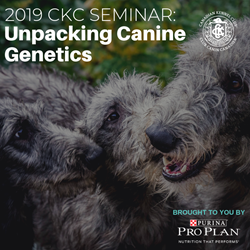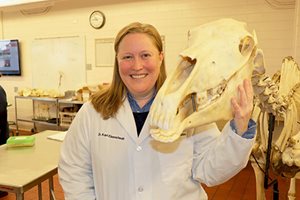Breeding purebred dogs requires time, appropriate resources, dedication, and most importantly, expertise. Making the decision to breed is a commitment—a responsible breeder strives to achieve specific goals that include improving immediate and long-term health and well-being of their breed(s). Continuing education is an important part of reaching these goals. Whether you are a novice breeder considering your first litter, or an experienced breeder looking to improve your breeding program, continuing education will help you improve your breeding program success.
 A Commitment to Increasing Access to Educational Resources
A Commitment to Increasing Access to Educational Resources
The Canadian Kennel Club (CKC) is committed to providing CKC member breeders with resources to support their growth and achieve their breeding program goals. The CKC Seminar was established in 2017 as a four-hour lecture in conjunction with CKC’s Annual General Meeting (AGM) with the goal of offering evidence-based content to attendees. The feedback from those who attended was revealing and consistent—almost all would attend again, would recommend the CKC Seminar to a friend, and asked for a longer Seminar. Building on 2017 and this feedback, the 2018 CKC Seminar was a day and a half, once again in conjunction with the AGM, and received similar feedback to the 2017 Seminar. This year, the CKC Seminar is a stand-alone, full two-day event.
You Asked, We Listened: 2019 CKC Seminar

Breeding, while rewarding, can be challenging to both the novice and the most experienced, particularly when navigating canine genetics. A significant portion of those who attended a CKC Seminar in the past indicated that genetics should be a topic for future years.
The 2019 CKC Seminar: Unpacking Canine Genetics is designed for breeders of all experience and knowledge levels, from those in the early stages of developing their breeding programs to those that have been breeding for decades. We are honoured to host genetics specialists Dr. Kari Ekenstedt, B.Sc., DVM, PhD of Purdue University, and Dr. Brenda Bonnett, B.Sc., DVM, PhD of the International Partnership for Dogs. An in-depth look at the topics to be discussed at the 2019 CKC Seminar on November 2 and 3 in Etobicoke, Ontario are revealed below.
Past CKC Seminars
The inaugural 2017 CKC Seminar focused on Reproduction and Breeding, with presenters Dr. Carol Graham of Graham Animal Hospital and Dr. Gayle Watkins, PHD and founder of Avidog International. Dr. Graham's presentation focused on how to determine the optimal timing for breeding and the tools and techniques available to breeders that play a role in a bitch's successful conception. Dr. Watkins’ presentation focused on factors influencing breeder choices and actions that can maximize neonatal survival and optimum health.

In 2018, the CKC Seminar focused on maximizing breeding program success. CKC had the honour of hosting Dr. Gayle Watkins again that year, along with Dr. Laurie Larson from the University of Wisconsin. Dr. Watkins presented on two topics: stud dog management and how timing is a critical component to successful breeding from beginning to end. Dr. Larson’s presentation focused on how antibody testing can support vaccination decisions with puppies and breeding dogs.
CKC had the opportunity to talk with Dr. Gayle Watkins, who shared her valuable insight on the importance of continuing education as part of a breeder’s strategy.
An Evidence-Based Approach

Throughout the past decade, North America has seen a spike in companion dog research. Dogs have become the “inspiration” for behaviorists, and studies demonstrating the importance of puppyhood and rearing, or what happens to the dam when she’s pregnant, have surfaced. Gayle’s motivation for starting
Avidog International stemmed from the lack of resources available to breeders looking to educate themselves. Books become outdated quickly and the research or studies available to the public can be hard to understand and access. There is a lot of information available, and Gayle strives to help breeders not only understand it, but also show how breeders can apply it to their dogs.
“I see good breeders as professionals, even if they do it as a hobby—they are doing a really important thing,” Gayle explained. “All professions and activities have continuing education and breeders just didn’t seem to have that. That’s why I started Avidog.”

The importance of staying informed on the latest science goes beyond choosing the right sire and dam to breed. There are many other important reasons to integrate new research and findings into your breeding program. A general lack of understanding of the effects of parent selection beyond health clearances, basic conformation and basic temperament can negatively affect the litters you produce. Ultimately, every breeder hopes for fewer puppy losses and no bitch losses, but there are other important reasons to stay on top of the latest science.
Gayle highlighted just a few of the many reasons that breeders should take an evidence-based approach throughout the breeding and the puppy rearing process.
Before Conception
One example Gayle described related to how research on the length of telomeres, a cap at the end of each strand of DNA that protects our chromosomes, has been directly linked to canine lifespan. “It has been shown that dogs with longer telomeres have a longer lifespans. Older stud dogs have longer telomeres and will give longer telomeres to their offspring. If breeders aren’t aware, they are likely to breed young stud dogs as they’re more fertile and tend to breed more easily. However, if we continue to breed younger, we are going to slowly begin to shorten the lifespan of our dogs. This is a subtle, but definitely important factor to consider. Not every breed has to worry about longevity, but a lot of breeds do,” Gayle explained.
 Throughout Pregnancy
Throughout Pregnancy
There are many issues, such as quality of nutrition or stress during pregnancy, that breeders need to be aware of. “A bitch that’s under duress during pregnancy will likely have detrimental effect on the lifespan, the health and the temperament of her puppies. The effects of this stress can be seen throughout the entire lives of those puppies,” explained Gayle.
After Birth
New science has confirmed reasons to avoid socializing puppies too late. “There is a lot of information about the lifelong power of early socialization” Gail said. “We now know so much more about how it develops a pup’s brain and body among many other benefits.”
Plan for Success
CKC is dedicated to supporting breeders with the resources they need to succeed. The 2019 CKC Seminar: Unpacking Canine Genetics is a learning opportunity and will undoubtedly be an invaluable experience for any breeder who wants to elevate their breeding program using evidence-based education.

Do you understand modes of inheritance, or know the difference between simply and complexly-inherited conditions? Dr. Ekenstedt, a specialist in canine molecular genetics and genomics at Purdue University in Indiana with her PhD and DVM, will answer your questions, creating a knowledge base for all attendees regardless of their existing familiarity of genetics. Case examples will be explored, looking at the different types of genetics and breed-specific tests available, the pros and cons of using pedigree-based Coefficients of Inbreeding (COIs) and more.

Dr. Bonnett, with a PhD in Epidemiology, in addition to a B.Sc. and DVM from the University of Guelph is an expert in dog health, medicine, breeding, animal welfare, and human-animal interactions. Her first presentation will discuss the multiple ways in which the Harmonization of Genetic Testing (HGTD) and the International Partnership for Dogs’ (IPFD) Expert Panel initiative are supporting robust, good quality genetic testing and providing the basis for enhanced genetic counseling. The pros and cons of pedigree-based COIs will be discussed, as will some of the new haplotype-sharing breed “wheels”, which demonstrate (sometimes unexpected) relationships between breeds.
Drs. Ekenstedt and Bonnett will round out the CKC Seminar together with a discussion on population level health and diversity and how this relates to individual breeding programs, as well as a conversation about breeding ethics and the welfare and international legislation challenges facing purebred dogs.
Learn more about the 2019 CKC Seminar and how you can participate: